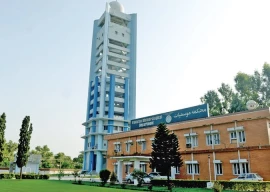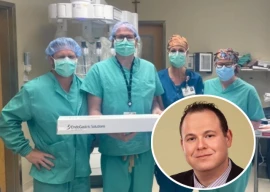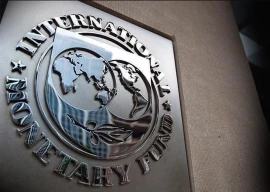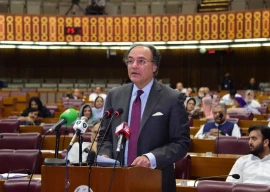
The Ojha Institute of Chest Diseases inaugurated their new diagnostic technology for the disease on Wednesday. The technology, introduced in collaboration with the National TB Control Programme has equipped Ojha to detect TB quickly and efficiently. It also looks out for the resistance of bactericidal antibiotic Rifampin in patients in less than two hours. Rifampin is the major antibiotic used to treat tuberculosis and takes six to eight weeks to find out if the infection is resistant to the drug through normal laboratory tests.
“Nobody is free [of the threat of] TB until everybody is free and cured of this disease,” said Prof Hameed. “Negligence, carelessness and lack of awareness leads to a very cruel and complicated form of the disease known as MDR-TB.”
The doctor explained that if a patient suffering from TB is treated improperly, they can develop a resistance to the normally prescribed drugs in which case the bacteria is no longer affected by the medication and develops into a strain known as MDR-TB.
“If such a person remains untreated, he affects an average 10 to 15 people with this complicated form of TB in a year and this creates a pool for this disease to expand,” added Prof Hameed.
The new technology, GeneXpert System, is patented by a US-based lab automation company called Cepheid and costs around $35,000. The system can be used at district and sub-district levels. The only problem is that it requires a stable electricity supply. While this is not a problem at Ojha it might cause issues at other sites.
The professor put the situation into perspective when he told The Express Tribune that over 200 MDR-TB patients are on the waiting list for treatment at Ojha alone. “Dow will treat those waiting patients with its own resources,” he said.
“Ojha has become the first public-sector institute in Pakistan with the latest diagnostic technology for MDR-TB,” said Dr Ejaz Qadeer, the national programme manager and chief guest.
The programme has acquired 12 such systems with the help of the United States Agency for International Development (USAID), he added. They will be installed at MRD-TB-treating hospitals in the next few months.
Provincial TB control manager Dr Asmat Ara, who acted as a mediator between Ojha and the programme, told The Express Tribune that at least 10 private hospitals in the country are equipped with the GeneXpert Systems. She felt public hospitals, where hundreds of poor patients are waiting for treatment, need them a lot more. According to her estimates, the treatment of normal TB takes eight months and costs Rs8,000 at public hospitals and almost 99% of the patients are cured. “But in the case of MDR-TB, the costs of treatment rise to half a million rupees in a span of two years and only 50 per cent of the patients are cured.”
400 bed hospital at Ojha Campus
The Dow College of Pharmacy lecture hall was bursting at the seams on Wednesday evening. Medical students clad in white lab coats, faculty members, reporters and security personnel thronged into the room to watch the ceremony marking the launch of a 400-bed tertiary care teaching hospital, Dow itself, a boys’ hostel and a sports gymnasium.
While the pharmacy college was completed four years ago, and is due to send out its first batch of graduates in a year, it was recently approved and inaugurated on Wednesday.
Governor Ishratul Ebad Khan spoke at what was the ‘concluding ceremony’ for the four projects he inaugurated at the Ojha campus of Dow University.
“Honourable Governor Sindh,” began Vice-Chancellor Prof Masood Hameed. “December 2003 was when you promulgated the ordinance for the establishment of this university; there were 4,002 aspiring doctors enrolled then. Now, with your kind support, we have reached in 2011 and our enrolment has exceeded 7,000 students.”
In his speech that was received with a standing ovation, Khan expressed his pleasure with the progress and expansion of the varsity. “This new 400-bed hospital, laboratories, diagnostic centres, new academic programmes and hundreds of future doctors, all have something within them for the betterment of underprivileged,” he said.
The general hospital is at the Ojha Campus, Suparco Road. It is now a teaching hospital attached to Dow International Medical College.
The hospital is replete with a 24-hour emergency room, backup portable ventilators and other equipment. The OPD block cares for an average of 14,000 patients each month.
Published in The Express Tribune, October 13th, 2011.
1725486048-0/Untitled-design-(5)1725486048-0-405x300.webp)

1725479441-0/school-shooting-(1)1725479441-0-165x106.webp)




















COMMENTS
Comments are moderated and generally will be posted if they are on-topic and not abusive.
For more information, please see our Comments FAQ